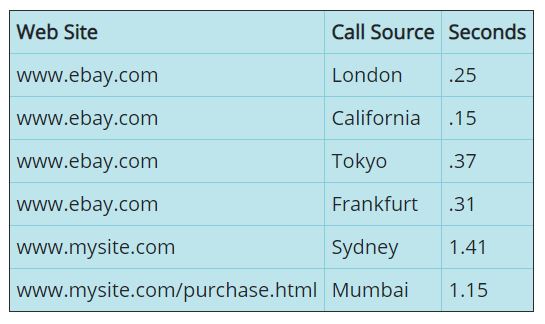How do you Enforce a Global Service-Level Agreement?
Posted on October 16th, 2019

Service-level agreements can be quite complex. However, many involve straight-forward performance metric requirements that are agreed to by a customer and its service provider. These can be informal agreements, or they can be legally-binding formal contracts that guarantee certain performance levels.
For example, a provider of a Content Delivery Network utilizing Edge Computing might promise page loads of a news content site at 500 ms or less from six continents. An Edge Computing network typically consists of Web server nodes existing around the world that enable the geographic caching of content from a centralized source. Having local copies of content enables faster delivery to recipients over the Web. This is because with Edge Computing, vast distances no longer need to be crossed to deliver data across the Internet. This is especially important in cases like mobile device content delivery where there is already a slight delay over mobile networks. Additional delay would be intolerable. Studies show that Website visitors expect pages to load in two seconds or less, and that nearly 50% of visitors will leave after three seconds. If there is a commerce component to a site, then sluggish load times could result in the loss of significant international business.
If you sign on to a Content Delivery Network provider leveraging Edge Computing, how can you be certain that you are getting the results you are paying for? One idea would be that if you have happen to have office locations around the world, you could ask a global network of colleagues to test and record page load performance and then email the results to you.
Another option, one that provides comprehensive geographic coverage and can be set up quickly, is to use an API that enables you to monitor the load times of Websites and load performance of other Web assets. In this scenario, a simple REST-based API call executes a page load action from a specified server located somewhere in the world. After executing, it then reports the load performance time back to you. Since APIs provide programmatic access to these capabilities, sets of scheduled calls can be performed from diverse locations at certain time intervals, such as daily, hourly, or even minute-by-minute. This would provide you with the global performance result data you need to determine if your Content Delivery Network provider is meeting Service-Level Agreement obligations.
One such API is Interzoid's Global Page Load API. You simply need to provide parameters to the API that name the source of the test to be performed (Tokyo, Paris, Buenos Aires, Sydney, Virginia, Mumbai, Singapore, etc.), and then also the URL of the page to be tested. That's it. The test action is performed and the load time is returned from the API call in JSON format to do with whatever you please.
Here is an example of possible results:

For more information, visit the home page of Interzoid's Global Page Load API:
Global Page Load API Overview
Global Page Load API Documentation
AI Interactive Data Client: Request and Receive Structured Data of Any Kind on Any Subject.
More...
Github Code Examples
More...
Generate your own Datasets: Retrieve Customized, Real-World Data on Demand as Defined by You
More...
High-Performance Batch Processing: Call our APIs with Text Files as Input.
More...
Try our Pay-as-you-Go Option
More...
Available in the AWS Marketplace.
More...
Free Trial Usage Credits
Check out our full list of AI-powered APIs
More...
Documentation and Overview
More...
Product Newsletter
More...